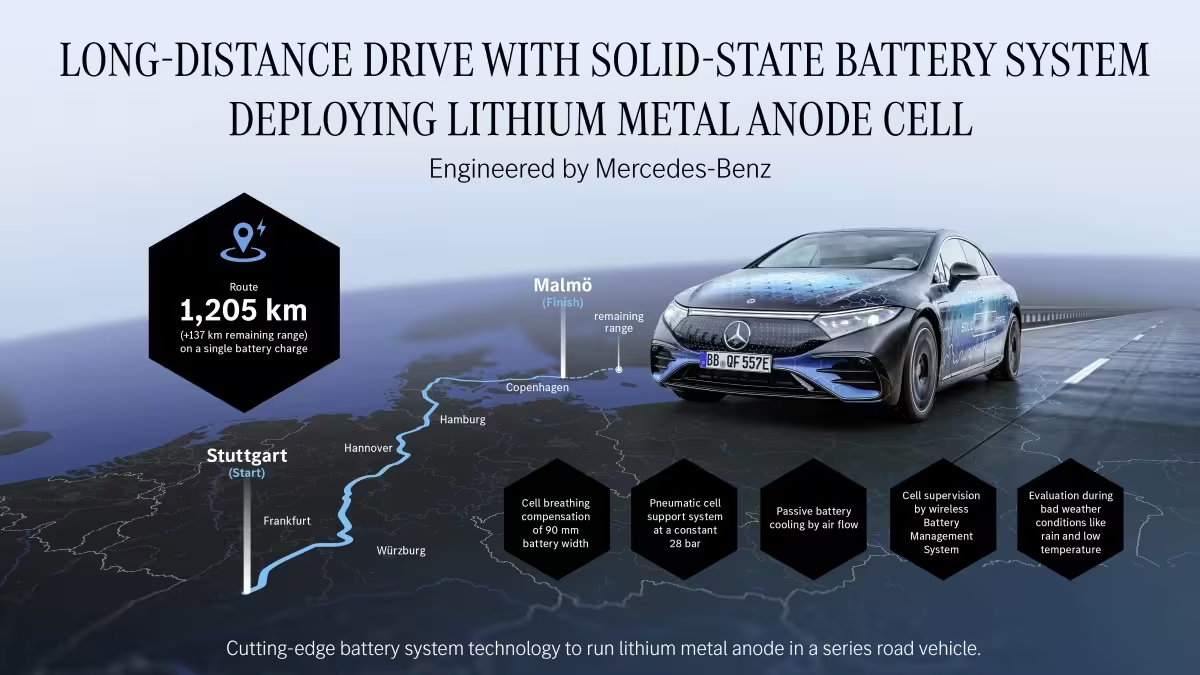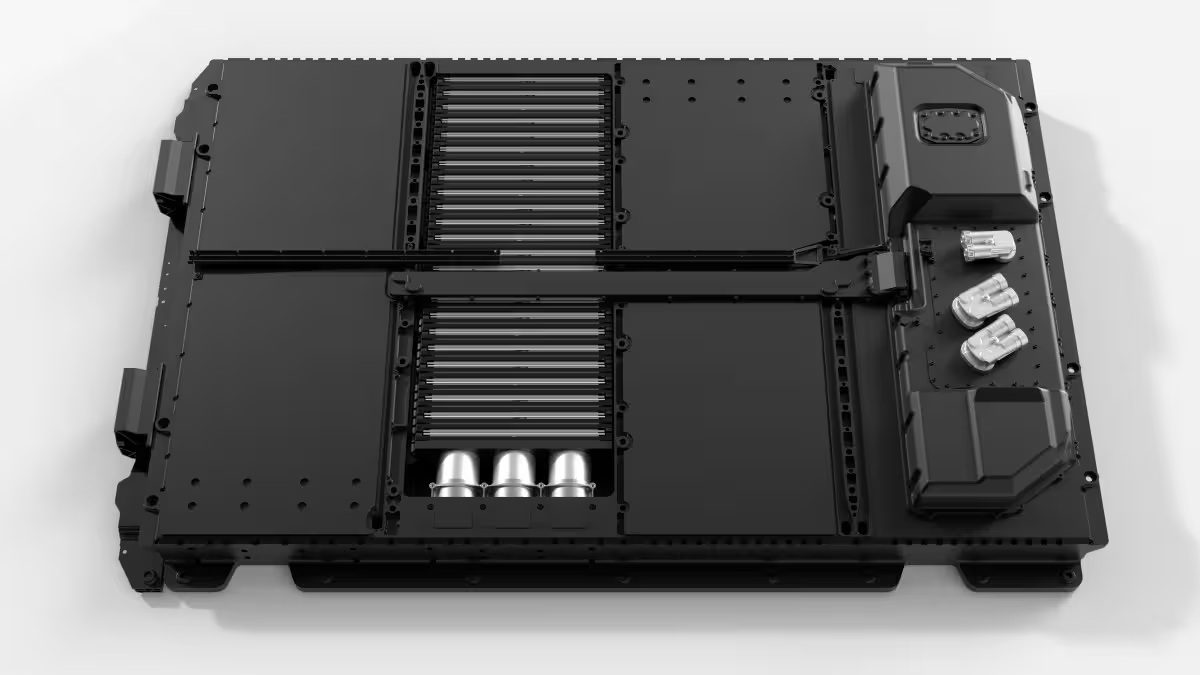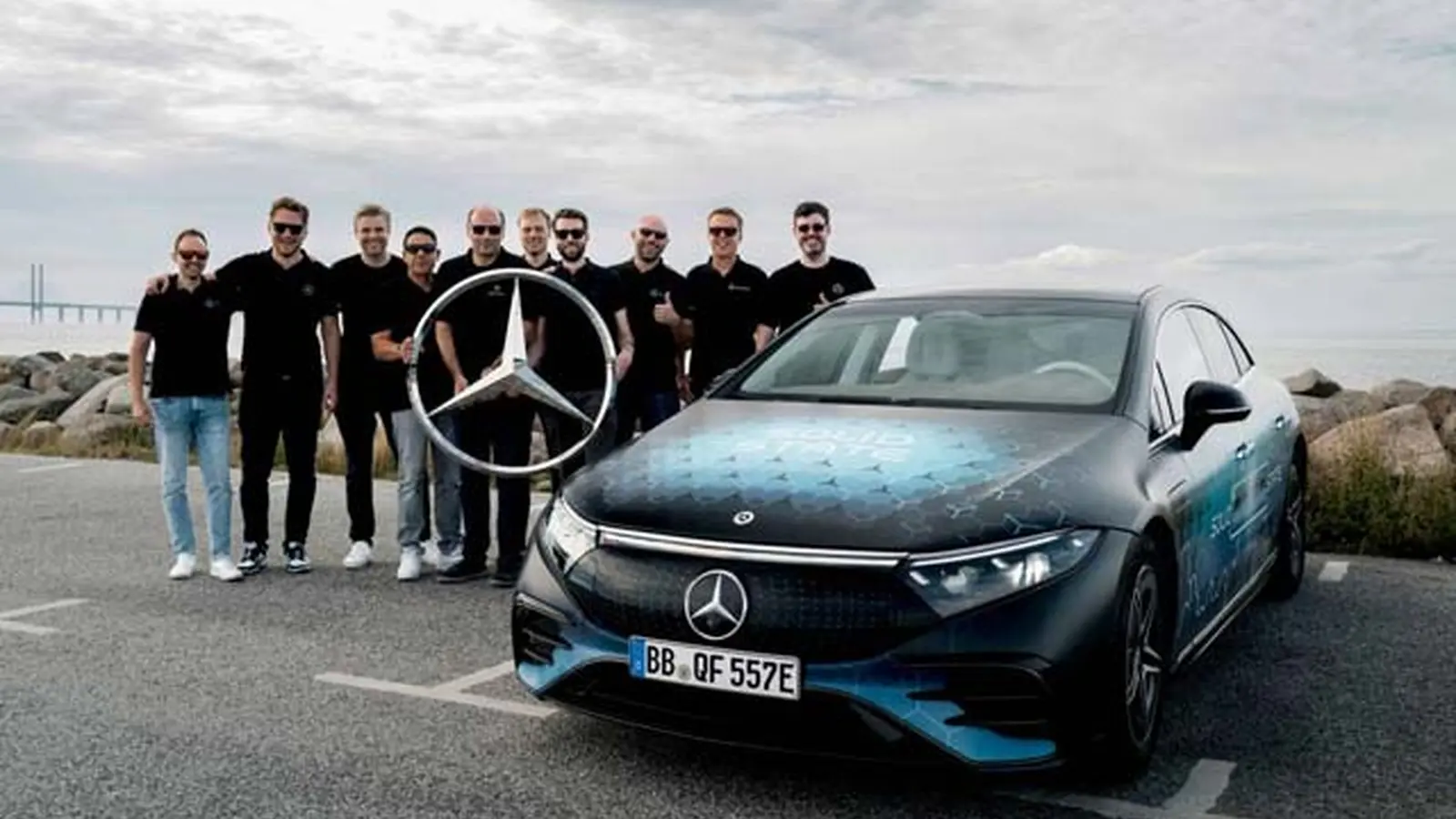5 Minutes
Record long-distance run: Stuttgart to Malmö on one charge
Mercedes has demonstrated a major step forward for electric mobility: an EQS test vehicle equipped with a lithium-metal solid-state battery completed a 1,205 km (749-mile) drive from Stuttgart, Germany, to Malmö, Sweden on a single charge, arriving with an estimated 137 km of range still available. The run took place as part of Mercedes' real-world validation program for next-generation battery technology and highlights how improved energy density can translate into long-range EV performance outside the lab.
What is behind the range gain?
The test vehicle uses lithium-metal solid-state cells developed in partnership with Mercedes-AMG High Performance Powertrains and supplied by US-based Factorial Energy. Compared with the standard EQS battery, the solid-state package reportedly delivers around 25% more usable energy while keeping weight and overall dimensions comparable. That boost in usable energy is the primary reason the EQS covered such an extraordinary distance without a recharge.
Battery technology and packaging
Solid-state chemistry replaces the liquid electrolyte used in conventional lithium-ion packs with a solid electrolyte and lithium-metal anode. This allows higher energy density and can improve safety and charging characteristics. Mercedes says the prototype battery’s physical footprint and mass remain similar to the production EQS battery, which simplifies integration and suggests the technology could transition to series production without major vehicle redesign.

Vehicle specifications and performance
Although Mercedes described the test EQS as only "lightly modified" relative to a production model (the battery chemistry being the main difference), the run demonstrates real-world range gains rather than lab-only figures. The EQS platform is already aerodynamically optimized and built for efficiency — features that, combined with higher-energy battery cells, produced the 1,205 km achievement. Specific powertrain tuning for the test was kept minimal to reflect what customers might expect when the technology reaches showrooms.
Key technical takeaways
- Distance achieved: 1,205 km (Stuttgart to Malmö) on a single charge
- Remaining range on arrival: ~137 km
- Usable energy increase: roughly +25% versus standard EQS battery
- Battery form factor: weight and size comparable to current EQS pack
- Development partners: Mercedes-AMG High Performance Powertrains and Factorial Energy
Design and efficiency
The EQS is Mercedes’ flagship electric sedan, designed around low drag and high-efficiency systems — an ideal testbed for advanced battery cells. Its streamlined silhouette, underbody aerodynamics, and efficient thermal management complement the denser energy storage and help maximize real-world range. The test underlines how vehicle design and battery chemistry must work together to reduce range anxiety and improve usability for long-distance travel.

Market positioning and production outlook
Mercedes positions the EQS as a luxury electric flagship, and integrating solid-state batteries could elevate both range and comfort for premium EV customers. Executives say these test runs are intended to evaluate performance across different climates and route profiles and to accelerate series production. While Mercedes has not given a precise launch date, company leadership has emphasized a goal of bringing solid-state innovations to production by the end of the decade, which would place this technology into the mainstream luxury EV market within the coming years.
Comparisons and industry context
The 1,205 km run narrowly outpaced the previous long-range demonstration by Mercedes’ Vision EQXX concept, which completed a Stuttgart-to-Silverstone trip that was 3 km shorter. Unlike the concept car — which prioritized extreme efficiency and was a near-experimental prototype — the EQS test car is closer to what customers will buy, reinforcing the credibility of the results. Compared to conventional lithium-ion EVs available today, an EQS with solid-state cells promises a meaningful jump in usable range without increasing pack size.
Implications for buyers and EV adoption
For drivers concerned about long-distance travel and charging infrastructure, solid-state batteries could be transformative: higher energy density means fewer charging stops and greater flexibility on road trips. Additionally, maintaining a similar battery weight and size simplifies integration into existing vehicle lines, potentially speeding up market availability. Mercedes' approach — scaling a proven vehicle architecture with improved cell chemistry — aims to reduce technical risk while delivering tangible benefits to customers.
Summary
Mercedes’ EQS long-distance test using lithium-metal solid-state cells demonstrates a concrete leap in electric range and reinforces the automaker’s roadmap toward series-ready next-generation batteries. With a 1,205 km single-charge run and 25% more usable energy in a similarly sized package, solid-state technology is emerging as a leading solution to extend EV range, improve safety, and accelerate mainstream adoption of electric vehicles.
Source: arenaev


Leave a Comment